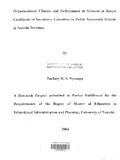| dc.description.abstract | The mam purpose of the study was to investigate whether a significant
relationship existed between organizational climate as perceived by teachers and
performance in sciences at K.C.S.E in public secondary schools in Nairobi
Province. The other purpose was to find out the significance of the relationships
between selected principals' and schools' variables and organizational climate.
The principals' demographic variables were; age, sex, area of specialization,
professional experience and academic qualifications. The schools' variables were;
category, sex of the student body and size.
The research design used was Ex Post Facto. The sample size comprised 40
principals and 320 teachers from a population of 47 principals and 2437 teachers.
Random sampling was used to select 8 teachers from each of the participating
schools.
Likerts profile of a school questionnaire was selected as the instrument of the
study. The organizational climate score was used to describe the school's climate
with respect to its position on Likert's authoritative-participative climate
continuum. The techniques used to analyse data were pearson correlation
analysis, Analysis of Variance (ANOVA) and t-tests.
Findings of the study indicated that there were no significant differences in
school organizational climate as a function of the principal's (a) age (b) sex (c)
area of specialization (d) professional experience and (e) academic qualification.
Additionally, there were no significant differences in school organizational
climate as a function of (a) school category (b) sex of the student body and (c)
school size.
However, there were significant differences in performance in sciences as a
function of school category. The mean performance index (MPI) for boarding
schools was significantly higher than for day schools. There were no significant
differences in performance in sciences as a function of the sex of the student
body, nor were there significant relationships between school organizational
climate and performance in sciences.
It was found that in cases where there were significant differences, there was a
small amount of variance in school organizational climate and performance in
sciences accounted for by the variables utilized in this study.
As a recommendation, the Ministry of Education (MOE) should encourage,
through legislation and education, widespread participation of stakeholders in
school decision making and policy formulation. This will create an enabling
school organizational climate for teachers and tempt them to improve
performance in sciences.
The Parents Teachers Association (PTA), though not playing a significant role in
school policy formulation, should be recognized through legislation and thus be
empowered to manage schools. This will encourage parents and teachers to own
the objectives of the school and be motivated to improve their performance.
The Kenya Institute of Education (KIE) can, for instance, play a pivotal role in
emphasizing parent-teacher-student participative practice through incorporation
into the content of the curriculum for educators and institutions of learning at preuniversity
level.
Replication of the research is suggested so as to draw participants from other
provinces and rural settings. Focus should also be directed to identification of
variables other than those utilized in this study that may significantly affect
organizational climate and performance. | en |

